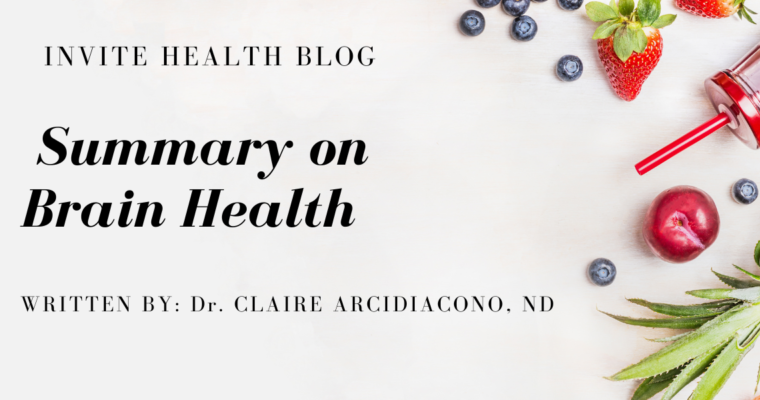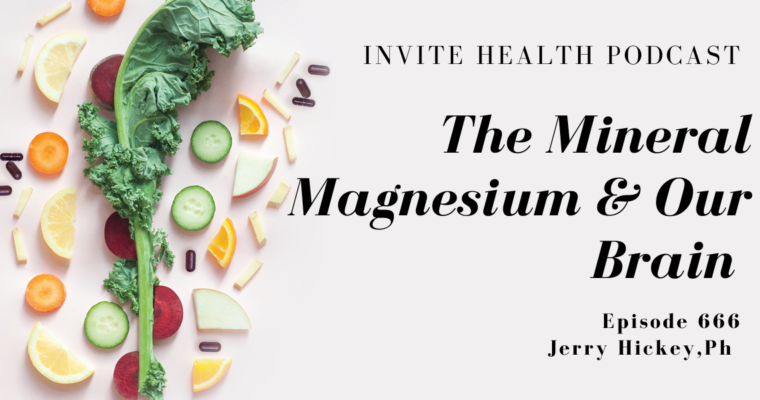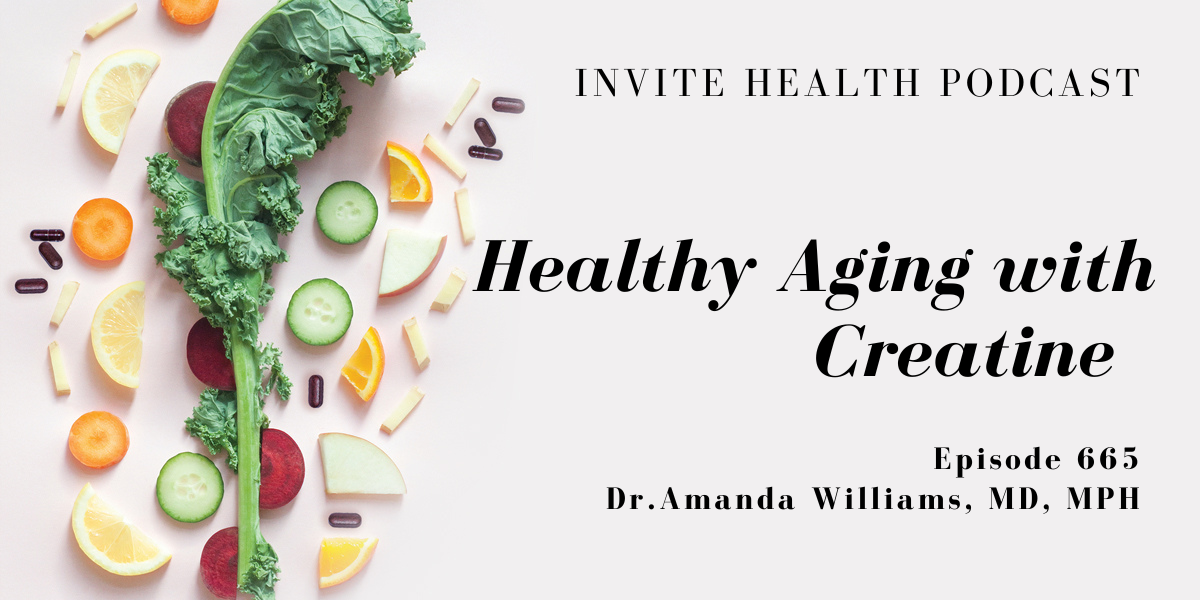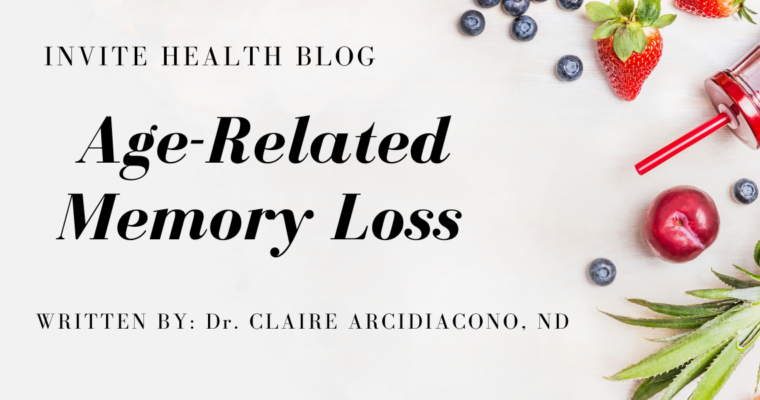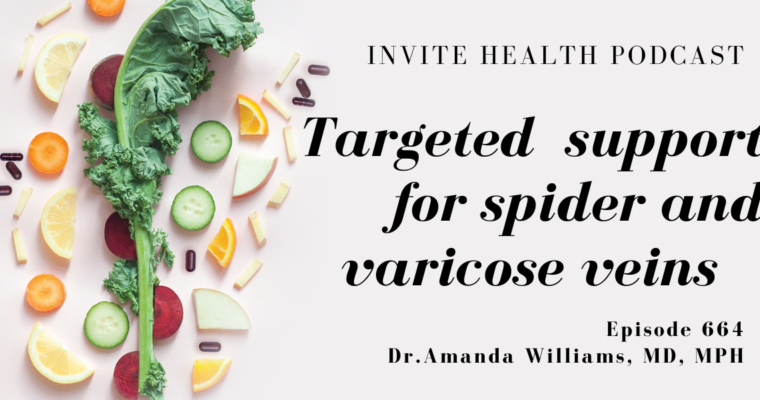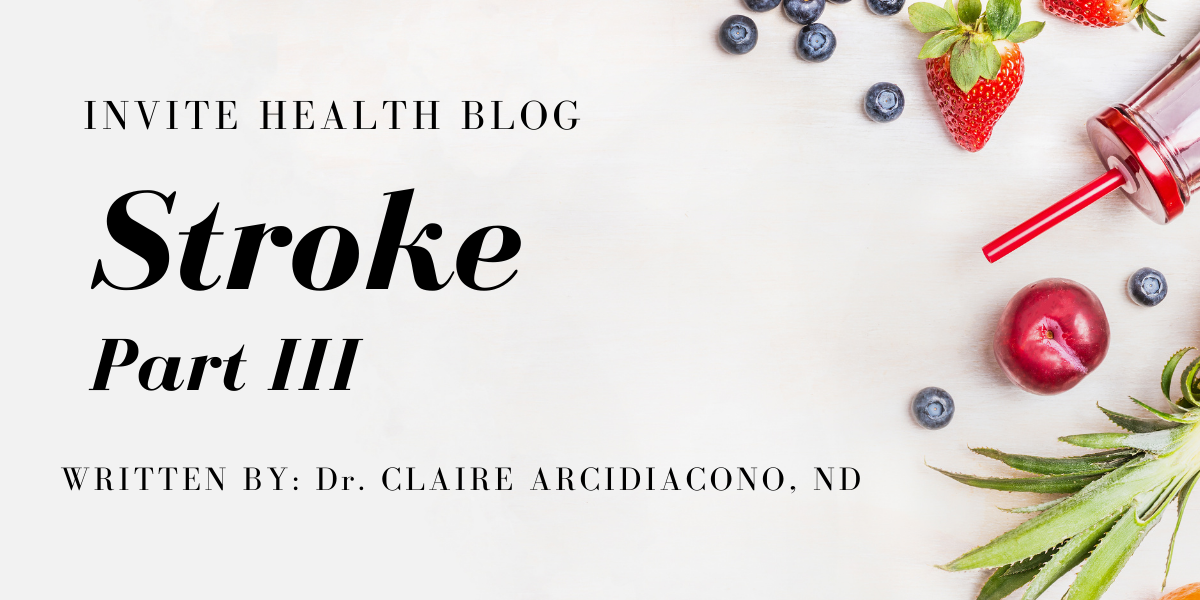Subscribe Today!
Please see below for a complete transcript of this episode.
HEALTHY AGING WITH CREATINE, INVITE HEALTH PODCAST, EPISODE 665
Hosted by Amanda Williams, MD, MPH.

*Intro Music*
InViteⓇ Health Podcast: [00:00:04] Welcome to the InViteⓇ Health Podcast, where our degreed health care professionals are excited to offer you the most important health and wellness information you need to make informed choices about your health. You can learn more about the products discussed in each of these episodes and all that Invite Health has to offer at www.invitehealth.com/podcast. First time customers can use promo code podcast at checkout for an additional 15% off your first purchase. Let’s get started. † [00:00:34]
*Intro Music*
Amanda Williams MD, MPH: [00:00:40] The body is made up of so many different molecules vitamins, minerals, antioxidants, amino acids, all of which serve a particular purpose or function in the body. And many times, we zero in on the importance of amino acids for maintaining our muscle mass, for helping us build strong, healthy muscles. But there’s also a really unique organic compound that we obtain from our diet but can also be indigenously made in the human body from different amino acids, and that is Creatine. So, today I want to zero in on creatine monohydrate and the benefits for creatine supplementation outside of that of just skeletal muscle support for those who are maybe working out. And that’s usually where most people think about creatine monohydrate use or supplementation, is for building strong muscles. But we know that the creatine has been studied so extensively that we are now understanding other pathways in the body that gives Creatine this super support to enhance our overall wellness, especially as we grow older. So, I’m Dr. Amanda Williams, scientific director at Invite Health. And let’s jump right into it. Let’s talk about Creatine. What in the world is creatine? While we know it is this organic compound, we find it predominantly in things like red meat and seafood as well as chicken. But we also know that the body has the ability to make creatine. And it does this through these different reactions involving arginine and glycine as well as methionine, and this occurs within the kidney and the liver. We know that the majority of creatine actually resides within our skeletal muscle. So, we’re looking at why it is so beneficial for muscle mass and muscle strength, because 95% of all creatine coming in from our diet, as well as what is made in the body, ends up in the muscles. But we also can see that there are other areas in the body, too, which creatine utilization is very, very helpful. And so looking at the synthesis and the metabolism of creatine, that’s kind of its own little scientific research world, and we recognize that through these different pathways from either taking creatine from our diet or for taking it supplementation wise as well as what is naturally being made in the body, that we can start to see its multiple benefits when it comes to anti-aging, which is why we in the science world look at creatine not only for its skeletal muscle support, but really when it comes to the ability to generate energy. And any time we can be supplementing with something that helps to facilitate energy production in our body, that means that we are helping to promote better cell longevity. So, if the cell has the capability to keep making ATP, adenosine triphosphate this is going to be very, very helpful and looking at the scientific research that’s come out through the years on creatine monohydrate supplementation and how it helps to enhance mitochondrial function, which in turn slows down that aging process. † [00:03:52]
[00:03:52] They’ve actually seen in animal studies how it can significantly lower the accumulation of a very well-known marker, which indicates accelerated rate of aging known as lipo fusion. And so, when lipo fusion is building up in the brain of these animals and they could see this, this is wow, these animals are aging quite rapidly, because we can see all of these deposits that are occurring. But then when they gave them creatine, they could see the kind of the reversal, the improvement, the anti-aging benefit that goes along with that. So, for us, looking at creatine supplementation, we say, well this is great because we’re gearing towards, you know, trying to protect our body from age related muscle mass loss and weakening of the underlying skeleton. But this is also quite beneficial when it comes to supporting our memory and our focus and our attention, because it’s helping to encourage better energy within the brain itself. So, the research on Creatine Monohydrate is incredibly impressive, and it’s probably one of the more widely studied nutrients out there at this point in time. And this is initially because it was so geared in that lane of exercise performance and for physical energy endurance. But now we can look at a journal such as the Experimental Gerontology Journal, where you can see the effects of creatine supplementation when it comes to cognitive function. So, they did an overall review of multiple randomized controlled trials. So, this is a meta-analysis, so they populated the data from multiple clinical research trials. So, there were six trials that they were assessing and looking at the improvement in short term memory in the ability to learn new things just from supplementation of Creatine Monohydrate. So, while that in and of itself is really impressive, we also have to take a step back and say, well, let’s look at the main reason why people supplement with creatine monohydrate and of course that is to protect our muscles from damage, hence why athletes use it. But we also know that it can help to protect our muscles from an accelerated aging process and when that accelerated aging process takes over, it actually can start to not only weaken the skeletal muscle, it weakens the underlying skeleton. So now there’s active research going on, looking at the impact of Creatine Monohydrate when it comes to bone health, which is really very impressive to think that via supplementation of this powerful molecule that helps the body generate energy, it helps to maintain our skeletal muscle mass. It’s also at the same time helping to promote greater protection for the bones. We’re not having this bone turnover occurring and they have done multiple studies to indicate that the way in which the creatine is working within the bone matrix is really quite impressive and they are finding that those who supplement with creatine monohydrate on a regular basis are actually having indications of stronger bones, not just stronger muscles, but stronger bones. And I talk about this quite often that, you know, if your skeletal muscles become weakened, this is in turn going to weaken the underlying skeletons or weakens the bones. So, if we can strengthen up our muscles, that in turn can help to strengthen and support the bones. † [00:07:22]
COLLAGEN KNOWN FOR JOINT & SKIN HEALTH, IS ALSO GOOD FOR MUSCLE, INVITE HEALTH PODCAST, EPISODE 657
[00:07:22] And we definitely are seeing this in the most recent trials when it comes to creatine supplementation and its impact on bone health. There was a fascinating study where they gave individuals who are over the age of 55 years old creatine every day for ten weeks. And then they were looking at different markers for bone turnover. So, this is looking at urinary analysis where you can see if you’re having a high amount or high rate of bone turnover. And they could see that compared to the placebo group that, the group that was taking the creatine monohydrate had a significant improvement when it came to their bone density and having less of that actual bone turnover. So, we do understand that when it comes to our aging bodies, that there are many factors that come into play that we have to have concerns with. One of which is the weakening of our muscles, the loss of muscle mass, which can then make us more prone to having a risk of a fall and then even having a fracture because we had a fall. So, taking Creatine monohydrate outside of that setting of just thinking, oh this is for folks who are going to the gym and working out, when we start to look at this and say, Oh no, this is actually for everyone who is concerned about trying to age gracefully because this very important molecule that we obtain, either via dietary supplementation or from the foods that we’re eating or the amount that is actually made and converted in the body naturally from arginine and glycine and methionine, this is a wonderful way for us to promote healthier aging. And now we can see those benefits in the Journal of Nutrients. They talk about how creatine supplementation really can facilitate significant cognitive support and the body of evidence that is out there at this point in time that is showing the therapeutic role of creatine supplementation when it comes to cognition, when it comes to memory, is incredibly impressive. Just as we’ve seen for so many years, the compelling body of evidence on creatine supplementation for muscle health. So, this new growing field of research to zero in and identify different nutrients that can help to support our aging brain is really on a fast tracked, and so I think it’s wonderful for us to understand that while we may look at creatine monohydrate and think, okay, yeah, it’s to build muscles, it’s for the support of muscles. We have to also recognize that the body is going to use that creatine to support our brain health as well. So, it’s definitely a product that’s worth checking out and considering that we are all getting older, it was probably an ideal formulation to have on board so we can age as gracefully as possible. † [00:10:12]
[00:10:13] So, I want to thank you so much for tuning in to the InViteⓇ Health Podcast. Remember, you can find all of our podcasts for free wherever you listen to podcasts or by going to invitehealth.com/podcast. Do make sure that you subscribe, and you leave us a review. You can follow us on Facebook, Twitter and Instagram and we will see you next time for another episode of the InViteⓇ Health Podcast. † [00:10:13]
*Exit Music*


